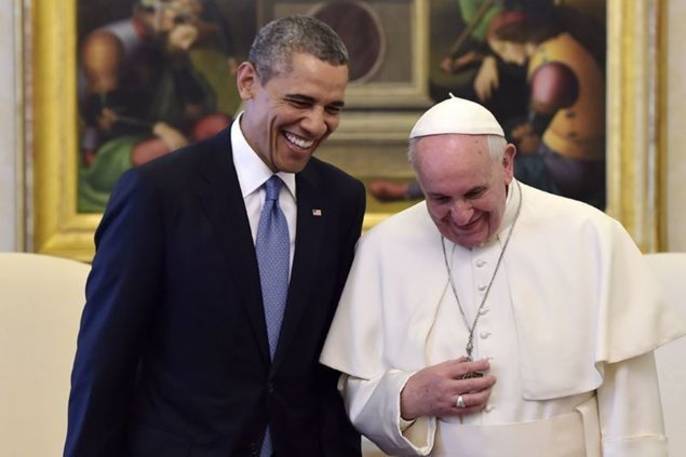


ROME - Predictably, no one protested louder than Beppe Grillo. Attacking U.S. President Barack Obama, who visited Italy March 27 as part of his European swing, Grillo said, or rather shouted: "He comes here to hustle his economy and to get himself photographed with the Pope. He's here to sell us his gasoline and because he's worried that we'll cut back on our buying the F-35s. And we stand idly by."
By this the comic-turned-politician who heads the controversial Movimento Cinque Stelle (M5S) was referring to the debate within the Defense Ministry over the purchase of 90 ultra-modern Lockheed Martin "warfighter" (its official description) planes under the U.S. Joint Strike Fighter program (JFS). The purchase is hotly debated because discussions begin this week in Parliament over cost-cutting measures proposed by the Defense Commission of Parliament, which include a revision of acquisitions, including under the JFS program.
Do Grillo's rants on defense spending matter? To some extent, yes, because polls show that, with perhaps 24% of popular support these days, his tightly-controlled M5S is Italy's second largest party. Even more importantly, Defense Minister Roberta Pinotti has called for a "moratorium" on defense spending, which may cut back on 50,000 military personnel over the next decade. But on the other hand, President Giorgio Napolitano (with whom Obama dined Thursday evening) made a point of reminding the government and parliament that Italy must respect its commitments to NATO. Although nothing on this is certain, Minister Pinotti reportedly now agrees.
On Thursday afternoon Obama met with Premier Matteo Renzi for a private, "frank and informal" meeting. Their agenda ranged from the controversial Italian purchase of F-35s and other defense issues to the crisis in the Ukraine, Italy's reform programs and need for economic growth, and the EU economy. Italian takes over presidency of the EU bthis summer for six months. On this viewpoints converged, and President Obama's message and manner delighted many.
The EU and the US, he said, can and should work together to improve shared conditions for prosperity and security. "There's a lot of ambition in his program, and I'm certain that it will serve not only Italy, but also all of Europe. In a personal way," Obama added, "I'm struck by Matteo's vision and energy." Matteo? Yes, Matteo.
Among the newspapers giving extensive coverage of President Obama's whirlwind Italian sojourn--just two nights and the day between--was the daily L'Unita', whose headline, "Obama: 'With Renzi as its president, the European Union will be very productive,'" was a far cry from the days when this was the Italian Communists' official party organ.
"The challenge of relations between the EU and the USA is fascinating," Renzi told the press after their session. "Our grandfathers fought for Europe, and the US fought to save democracy in Europe. Now the EU must again become a place of stability and growth." Obama's message was authoritative, strong and clear, said Renzi, who concluded with his own admonition to his fellow Italians: "Italy will try to carry it [the Obama message] forward during the semester of our presidency--and we will be able to do so only if we carry our own weight."
A few here lost no time in pointing out that Rome Mayor Ignazio Marino had not been included in the formal planning. Desperately eager (so said some) to speak with Obama, Mayor Marino went to the airport and waited on the tarmac by the steps to the plane when Obama was departing "to get a selfie," said one of the truly nasty. In fact, Marino issued the invitation, backed by President Napolitano, to return to Italy for a longer visit in June.
To the extent that there was criticism in Italy, it was not of President Obama, but of the US press tendency to ignore Italy in preference to Obama's meeting with Pope Francis. Indeed their private meeting did steal the show, even as its content--fully discussed from the U.S. side but given a brief press release by the Vatican--left some puzzled and guessing whether basic theological differences between the US and the Vatican (read: Obamacare and birth control) may have struck a momentarily awkward note.
However, the U.S. ambassador to the Holy See, Kenneth Hackett, issued a positive statement that, "The pope is leading people to a higher platform of 'think more deeply about what you're doing.'" In an interview with Vatican Radio, the ambassador said that a particularly striking aspect of the visit was "the role of the political leader and the role of the moral leader, and how they complement each other. I thought that was intelligent, wise and profound."
President Obama confirmed that in his talk with Pope Francis the two touched upon difficult international situations in which the Catholic Church and the U.S. could work together. One area for their future cooperation is the battle against the global trafficking of human beings, which already involves Anglicans and Muslims as well as Catholics. Wide-ranging discussions on specific international crisis areas regarded Crimea, North Korea, Iran, Syria and the efforts toward peace in the Holy Land. "There is hope that progress can be made," Ambassador Hackett said, while acknowledging, "It is difficult."
Source URL: http://440468.6bgr9ubv.asia/magazine/focus/op-eds/article/obama-arrivederci-and-come-back-real-soon
Links
[1] http://440468.6bgr9ubv.asia/files/obamapapajpg1396126973jpg